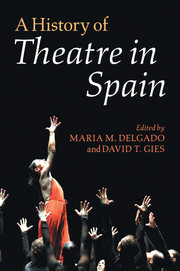Book contents
- Frontmatter
- Contents
- Illustrations
- Contributors
- Acknowledgements
- Introduction
- 1 The challenges of historiography
- 2 Lope de Vega, Calderón de la Barca and Tirso de Molina
- 3 The world as a stage
- 4 Playing the palace
- 5 The art of the actor, 1565–1833
- 6 Theatrical infrastructures, dramatic production and performance, 1700–1759
- 7 Popular theatre and the Spanish stage, 1737–1798
- 8 Theatre of the elites, neoclassicism and the Enlightenment, 1750–1808
- 9 Actors and agency in the modern era, 1801–2010
- 10 Zarzuela
- 11 Nineteenth-century Spanish theatre
- 12 Copyright, buildings, spaces and the nineteenth-century stage
- 13 Modernism and the avant-garde in fin-de-siècle Barcelona and Madrid
- 14 Continuity and innovation in Spanish theatre, 1900–1936
- 15 Theatrical activities during the Spanish Civil War, 1936–1939
- 16 Theatre, colonialism, exile and the Americas
- 17 Theatre under Franco (1939–1975)
- 18 Flamenco
- 19 Nationalism, identity and the theatre across the Spanish state in the democratic era, 1975–2010
- 20 Directors and the Spanish stage, 1823–2010
- 21 This evolution is still ongoing
- 22 Theatre as a process of discovery
- 23 Theatre is the art of the future
- Select bibliography
- Index
- References
1 - The challenges of historiography
The theatre in medieval Spain
Published online by Cambridge University Press: 05 June 2012
- Frontmatter
- Contents
- Illustrations
- Contributors
- Acknowledgements
- Introduction
- 1 The challenges of historiography
- 2 Lope de Vega, Calderón de la Barca and Tirso de Molina
- 3 The world as a stage
- 4 Playing the palace
- 5 The art of the actor, 1565–1833
- 6 Theatrical infrastructures, dramatic production and performance, 1700–1759
- 7 Popular theatre and the Spanish stage, 1737–1798
- 8 Theatre of the elites, neoclassicism and the Enlightenment, 1750–1808
- 9 Actors and agency in the modern era, 1801–2010
- 10 Zarzuela
- 11 Nineteenth-century Spanish theatre
- 12 Copyright, buildings, spaces and the nineteenth-century stage
- 13 Modernism and the avant-garde in fin-de-siècle Barcelona and Madrid
- 14 Continuity and innovation in Spanish theatre, 1900–1936
- 15 Theatrical activities during the Spanish Civil War, 1936–1939
- 16 Theatre, colonialism, exile and the Americas
- 17 Theatre under Franco (1939–1975)
- 18 Flamenco
- 19 Nationalism, identity and the theatre across the Spanish state in the democratic era, 1975–2010
- 20 Directors and the Spanish stage, 1823–2010
- 21 This evolution is still ongoing
- 22 Theatre as a process of discovery
- 23 Theatre is the art of the future
- Select bibliography
- Index
- References
Summary
Current evidence for the existence of theatre in medieval Castile – where liturgical drama is thought to have its origins – is now so abundant that Fernando Lázaro Carreter's statement made over fifty years ago – ‘La historia del teatro en lengua española durante la Edad Media es la historia de una ausencia’ (The history of theatre in the Spanish language during the Middle Ages is the history of an absence) – might need some revision. Lázaro Carreter's pronouncement remained authoritative as late as the revised 1965 edition of his original work, but more importantly it weighed heavily on scholars who sought to study this chapter of the literary history of Spain. But by the 1970s new discoveries (in libraries and archives, or through re-readings of poetry collections) were being made and historians began to free themselves, albeit timidly, from what had become an inherited certainty, repeated ad infinitum in books and classrooms. In the absence of other data, until the 1970s researchers worked with a list of titles that was as limited in number as it was disconcerting in its chronology. The list began with an exceptional piece, the Auto de los Reyes Magos (Play of the Three Kings), and ended with the work of an extraordinary poet and musician, the Salamancan Juan del Encina (1468–c. 1530), whose first dramatic production was included in his Cancionero de 1496 (1496 Songbook), a collection of verse compositions whose printing Encina personally supervised.
The starting date for theatre in Castile, therefore, was the end of the twelfth century, corresponding to Ramón Menéndez Pidal's dating of the Auto de los Reyes Magos. Encina's late fifteenth-century compilation provided a clear marker for the end of that period, although medievalists tended to overlook it for three reasons: first, so as to focus on the second theatrical era of Juan del Encina, marked by his return to Spain from Italy – as was the case with many other artists of the time; second, so as to be able to examine individual pieces, most of them anonymous, published during the first part of the sixteenth century; and, third, so as to be able to include forms or items of special interest, such as references to a local dance called esturdión.
- Type
- Chapter
- Information
- A History of Theatre in Spain , pp. 18 - 35Publisher: Cambridge University PressPrint publication year: 2012



